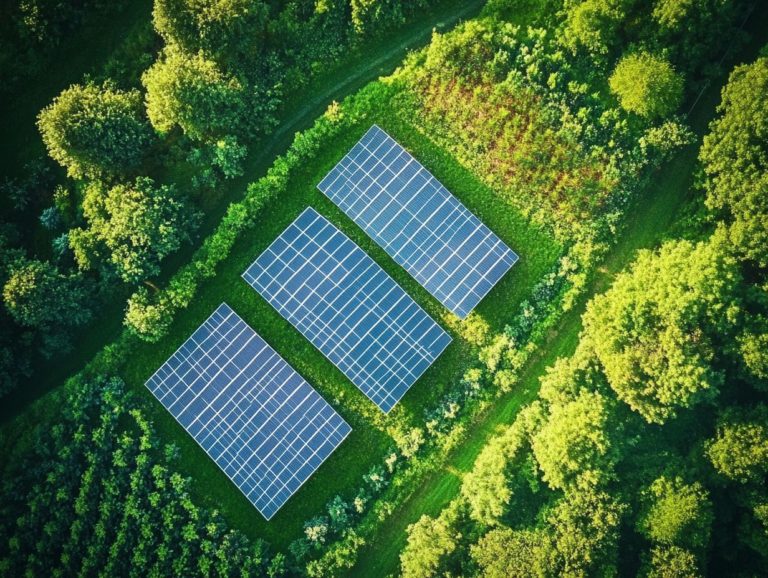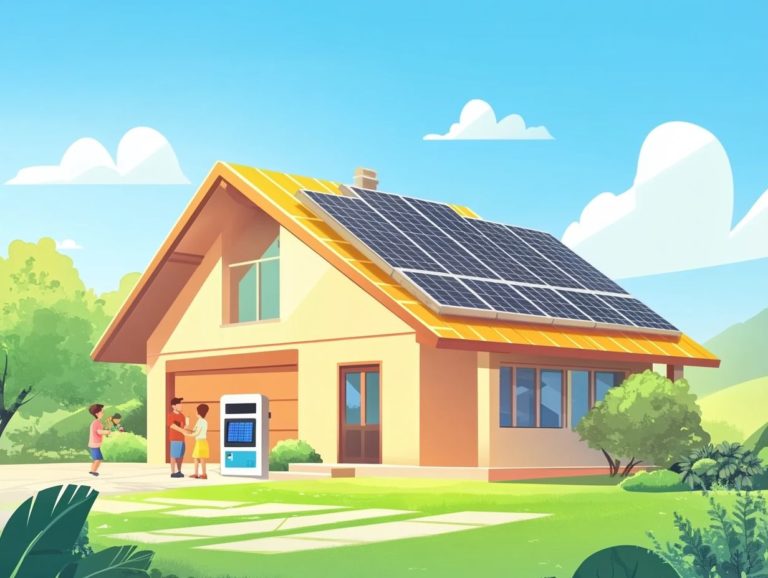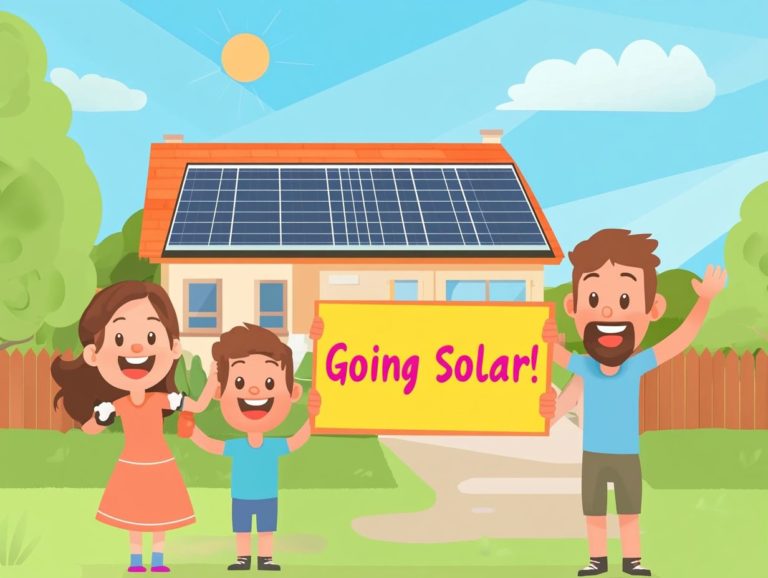“How to Get the Most Out of Your Solar Investment”
In a world where sustainability seamlessly intertwines with technology, investing in solar energy emerges as an astute choice for both homeowners and businesses.
Understanding the nuances of solar investment is your gateway to reaping many benefits. This guide covers essential factors that will shape your solar journey, including location, system size, and enticing financial incentives like tax credits and rebates.
It also highlights common pitfalls to avoid and offers invaluable tips to ensure your solar investment is rewarding over time. Whether you’re simply curious or ready to take the plunge, this resource will provide you with the insights necessary to fully optimize your solar potential.
Contents
- Key Takeaways:
- Understanding Solar Investment
- Factors Affecting Solar Investment
- Maximizing Solar Investment
- Financial Incentives for Solar Investment
- Common Pitfalls to Avoid
- Frequently Asked Questions
- What are the benefits of investing in solar energy?
- How can I ensure I am getting the most out of my solar investment?
- Is it necessary to hire a professional for installation and maintenance?
- What factors should I consider before investing in solar energy?
- Are there any financial incentives for investing in solar energy?
- How long does it take to see a return on investment for solar energy?
Key Takeaways:
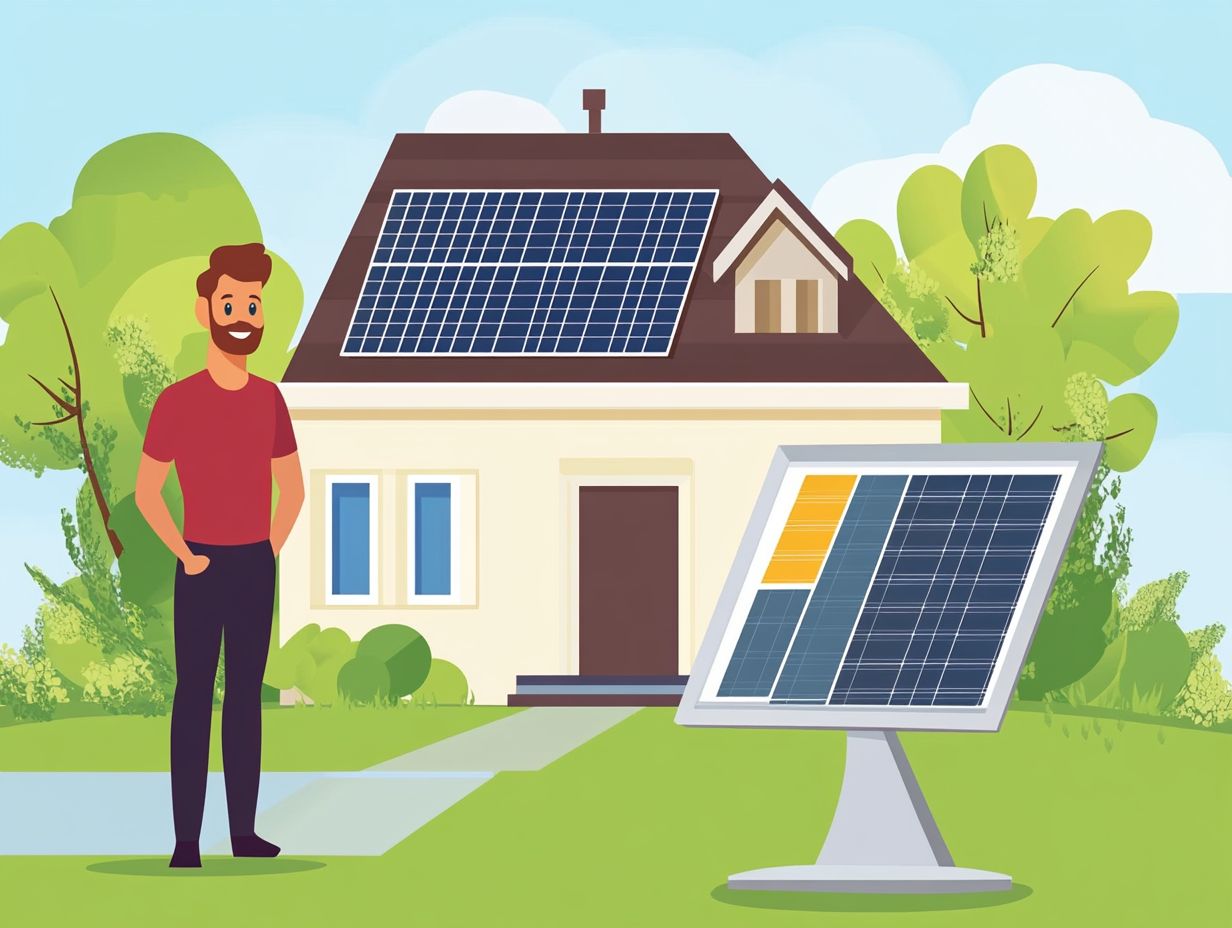
Understand solar investment as a long-term financial commitment that requires careful consideration of factors such as location, climate, and system size.
Maximize your solar investment by choosing the right system and regularly maintaining and monitoring it for optimal performance.
Take advantage of financial incentives like tax credits and net metering to increase the return on your solar investment.
Avoid common pitfalls like overestimating savings and not factoring in long-term maintenance costs for long-term success.
Understanding Solar Investment
Understanding solar investment is essential for anyone aspiring to achieve financial independence and embrace a sustainable lifestyle.
By harnessing solar energy through efficient solar energy systems, you can significantly reduce your energy bills while also positively impacting the environment.
The journey into solar energy begins with evaluating solar panels and their efficiency, which are crucial for ensuring you reap the maximum benefits from your investment.
Installing a solar monitoring system helps you track performance, ensuring that you re fully optimizing your solar energy ventures.
What is Solar Investment?
Solar investment is about channeling resources into solar energy systems, like solar panels, to attain financial independence and sustainability. This strategic commitment involves integrating various essential components, including photovoltaic cells (the technology that converts sunlight into electricity), inverters, and battery storage solutions, each playing a critical role in capturing sunlight and converting it into usable electricity.
By embracing solar technology, you can drastically reduce your dependence on traditional energy sources, unlocking significant long-term financial advantages. This means you can enjoy lower electricity bills and make a real difference for the planet!
Through solar investment, you re not just ensuring energy efficiency; you re also nurturing a sustainable future for generations to come.
Factors Affecting Solar Investment
Several factors play a crucial role in your solar investment, including your geographical location, climate conditions, and the size and type of solar system you choose to deploy.
Understanding these elements is key to maximizing the efficiency of your solar panels and optimizing the entire investment process.
Considerations like the potential for solar energy storage systems and their compatibility with electric vehicles can significantly impact your return on investment.
Location and Climate
Location and climate are crucial factors that determine how effectively solar panels and overall solar energy systems perform.
In regions blessed with abundant sunshine, particularly in the southern areas, solar panels can operate at peak efficiency for extended stretches, yielding impressive energy outputs.
On the flip side, in places like Calgary, where colder temperatures and unpredictable weather reign, sunlight availability can vary significantly throughout the year. While this city enjoys its fair share of sunny days, especially during the summer months, winter conditions can hamper energy production.
These geographical and climatic considerations play a significant role in shaping your decisions about solar investments. As a potential buyer, you ll want to consider not only the initial costs but also the long-term benefits and the adaptability of solar technology in the face of changing weather patterns.
System Size and Type
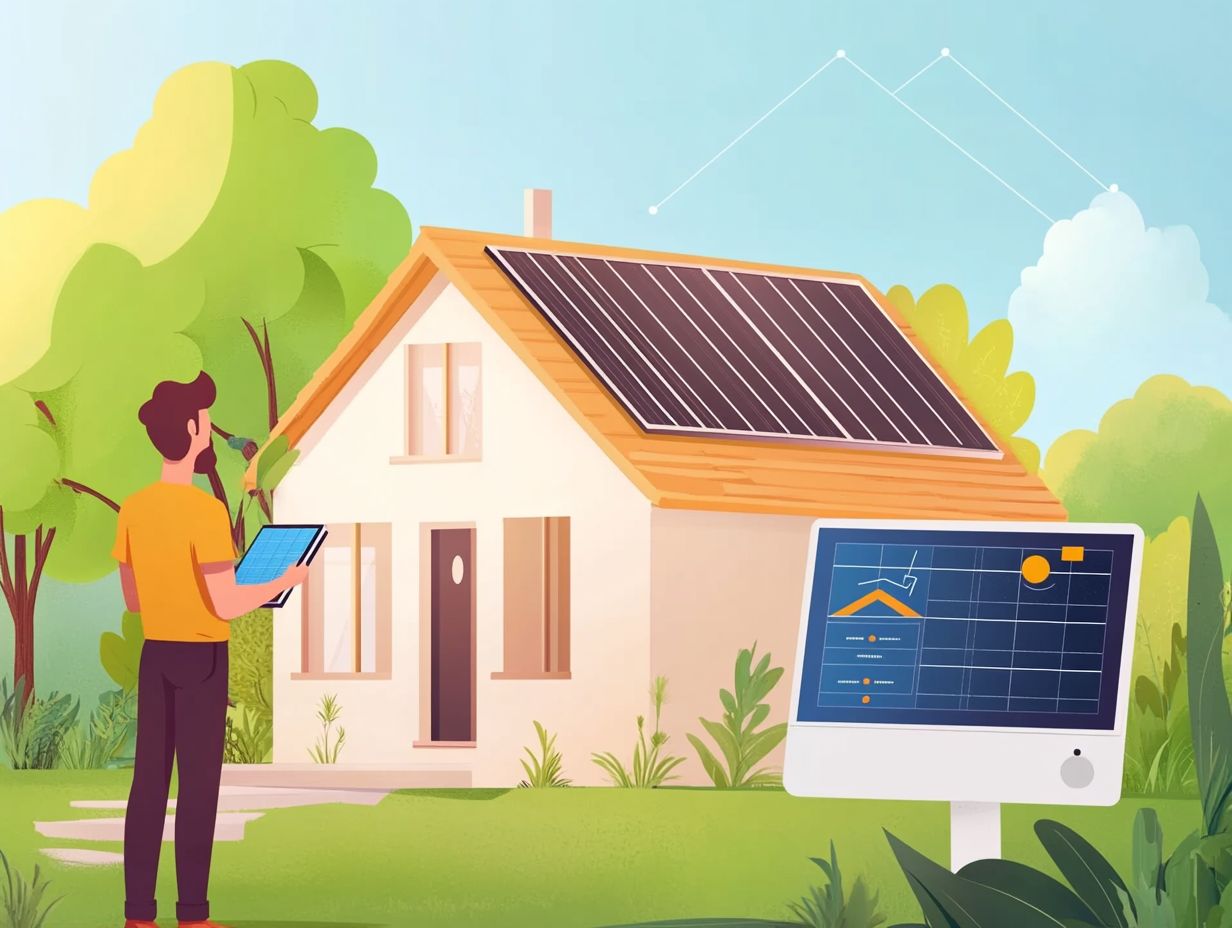
Choosing the right system size and type is essential for optimizing the efficiency of your solar panels and effectively meeting your energy needs.
As you explore solar energy solutions, you ll encounter various options, like rooftop solar panels that can be customized to fit your available space and specific energy consumption patterns.
If you re looking for an alternative, solar thermal heating systems harness sunlight to heat water. These systems are an excellent choice for your residential hot water requirements.
The overall efficiency and potential return on investment for these systems hinge significantly on their size. A well-sized installation captures energy maximally and reduces long-term costs. This ensures you enjoy substantial savings on your energy bills while actively contributing to a more sustainable future.
Maximizing Solar Investment
Maximizing your solar investment entails a series of essential steps. These steps include selecting the ideal system, conducting regular maintenance, and diligently monitoring performance to ensure optimal energy generation and utilization.
By carefully choosing the right solar power solutions and adopting a comprehensive maintenance strategy, you can significantly enhance the efficiency of your solar panels. This ultimately elevates your overall returns.
Choosing the Right System
Take the time to explore the exciting options available! Choosing the right system is essential for achieving optimal performance from your solar panels and ensuring efficient energy generation.
You should evaluate various types of solar power systems, such as solar panels that convert sunlight into electricity.
For those who drive electric vehicles, integrating solar energy storage systems is vital. These systems enable you to store excess energy for evening charging, helping to reduce reliance on the grid.
They can also support other energy-efficient appliances, making your life more convenient while promoting sustainability.
By selecting the right combination, you can significantly boost your energy independence and overall efficiency.
Maintaining and Monitoring Your System
Regular maintenance and a robust monitoring system are crucial for ensuring the longevity and efficiency of your solar panels. These practices help you maintain optimal energy output and extend the life of your investment through timely repairs and adjustments.
By routinely checking your panels for dirt, debris, and signs of wear, you can utilize advanced monitoring systems to effectively track performance metrics such as energy production and system health.
This real-time data gives you the power to promptly identify any issues, minimizing downtime and maximizing your energy savings.
Ultimately, through diligent oversight and regular check-ups, you can safeguard your solar investment and enhance your overall return, ensuring that your system continues to perform at its peak.
Financial Incentives for Solar Investment
Financial incentives are essential in making solar investments more attractive. They significantly lower upfront costs.
Don t miss out on programs like government incentives and tax credits that can save you big! By leveraging these options, you can effectively reduce the financial barriers to adopting solar energy solutions.
This not only enhances the feasibility of your investment but also positions you to reap substantial long-term benefits.
Tax Credits and Rebates
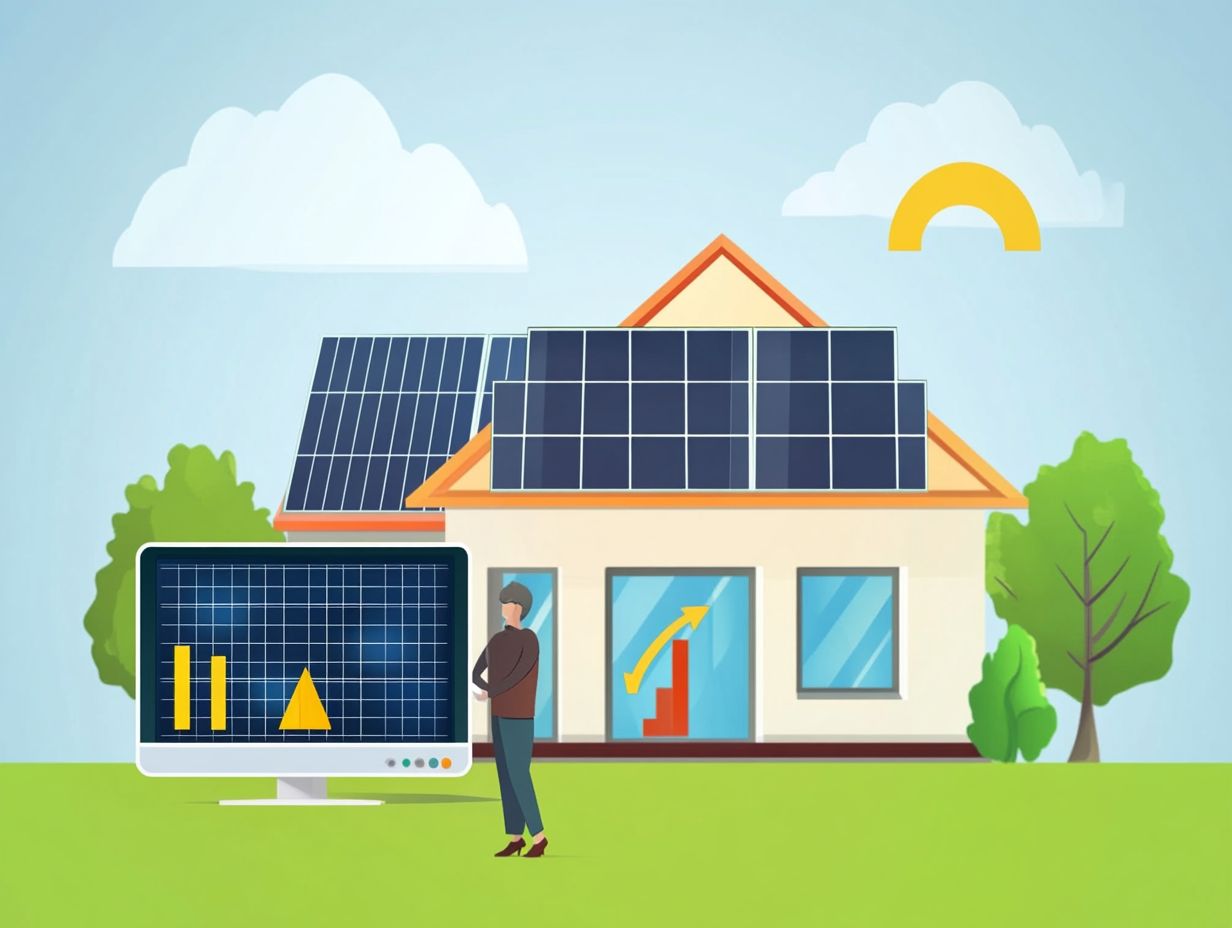
Tax credits and rebates serve as compelling financial incentives that can significantly reduce the overall costs associated with your solar investment. This paves the way for greater financial independence.
These financial aids not only diminish your initial expenses but also broaden the appeal of renewable energy systems to a larger audience.
Take, for example, the federal solar tax credit, commonly known as the Investment Tax Credit (ITC). This allows you to deduct a considerable percentage of your solar system installation costs from your federal taxes, potentially leading to substantial long-term savings.
Various states offer their own rebates and incentives, amplifying the advantages of transitioning to solar energy.
By embracing solar, you re not just making an eco-friendly choice; you re also reaping distinct benefits, such as lower utility bills, which translates into even greater financial rewards over time.
Net Metering
Net metering is a smart billing system that allows solar energy system owners to receive credit for the surplus solar energy they produce. This leads to significant savings on energy bills.
When the sun shines brightly and your solar panels generate more electricity than you need, that extra energy flows back into the grid. You can then use these credits when solar production dips, like at night or on overcast days.
This process balances your energy consumption with the energy you produce, maximizing your financial return on your solar investment.
By reducing your monthly utility expenses and taking advantage of local policies that promote renewable energy, you not only enjoy economic benefits but also contribute to environmental sustainability. More and more homeowners are discovering how rewarding solar systems can be!
Common Pitfalls to Avoid
Several common pitfalls can hinder your solar investment success, including overestimating potential savings and neglecting long-term maintenance costs.
Overestimating Savings
A common mistake in solar investment is overestimating savings from solar energy systems. You might imagine a scenario where your energy bills drop dramatically overnight, but it s important to understand the factors involved in calculating actual savings.
Your location, the size and efficiency of your solar setup, and local energy rates are crucial in determining the true financial benefits. The performance of solar panels can vary significantly based on weather conditions and technological advancements, adding further complexity.
Using accurate data on renewable technology performance and considering energy-efficient appliances helps create a realistic outlook. This approach leads to better decision-making and more sustainable investments.
Not Considering Long-Term Maintenance Costs
Neglecting long-term maintenance costs can result in unexpected financial burdens for solar investors. Overlooking this crucial aspect of financial planning can significantly reduce the returns anticipated from your solar investments.
Budgeting for routine upkeep is essential for long-term sustainability and efficiency. Setting aside funds for maintenance protects your systems from potential issues that may arise, ensuring they perform optimally.
This comprehensive approach to financial planning allows you to avoid surprise expenses and fully enjoy your solar energy systems without the stress of unforeseen costs.
Essential Tips for Maintaining Your Solar System
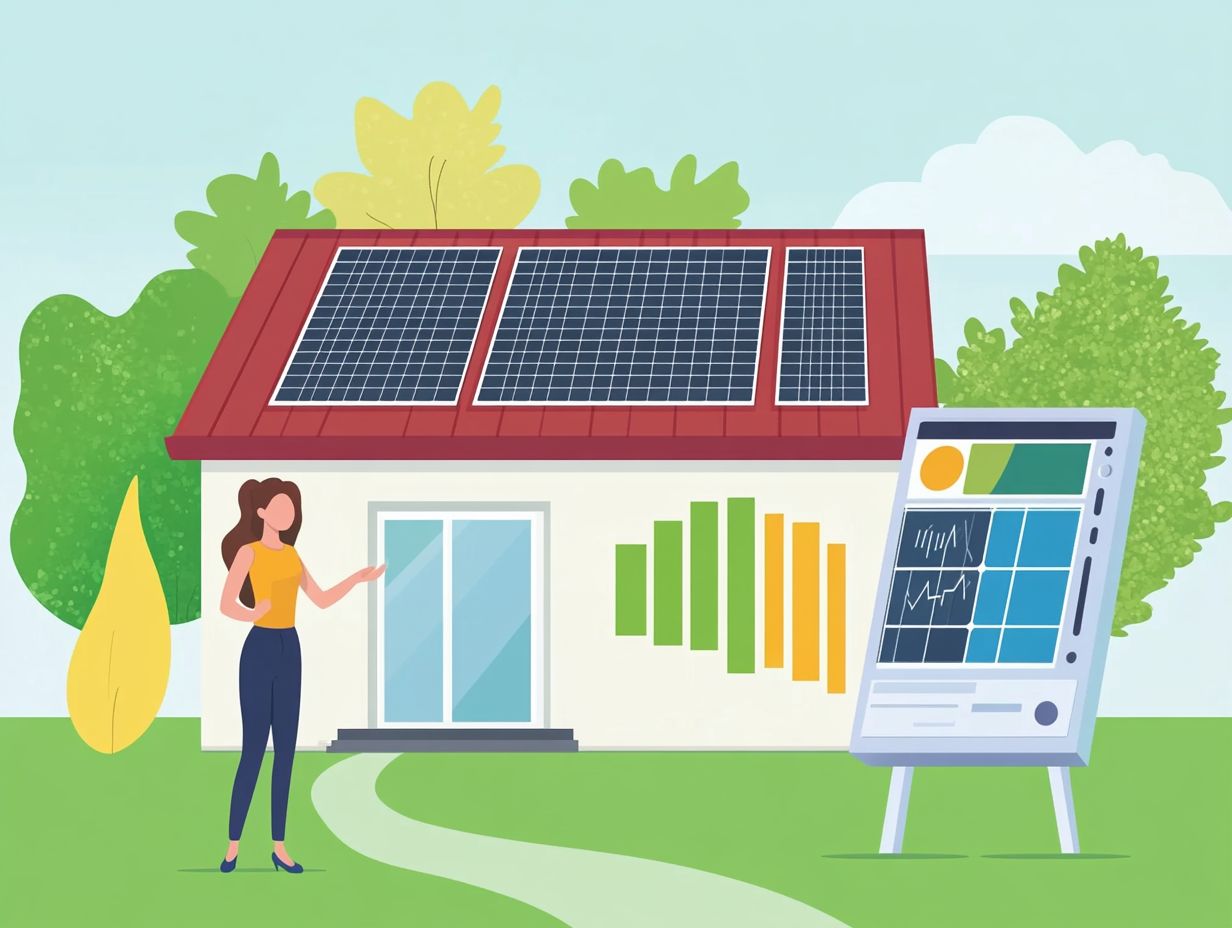
To secure long-term success with your solar investment, adopt strategies for routine maintenance and effective performance monitoring.
Schedule semi-annual inspections with professionals who can assess your system for wear and tear, clean the panels, and identify any shading issues that may hinder efficiency.
Regularly review your energy production data to spot discrepancies and address them quickly. Monitoring your inverter s performance can prevent unexpected downtime, ensuring your system operates efficiently.
By implementing these practices and using monitoring tools, you can extend the lifespan of your solar system while maximizing your savings and return on investment.
Frequently Asked Questions
What are the benefits of investing in solar energy?
Investing in solar energy saves you money on bills, increases your property value, and helps the environment. Solar energy is a renewable and sustainable source, making it a smart, environmentally-friendly investment.
How can I ensure I am getting the most out of my solar investment?
To maximize your solar investment, properly size your system, maintain the panels regularly, and monitor your energy production. Using energy-efficient appliances also enhances the benefits of your solar panels.
Explore solar options or contact a professional for personalized advice to get started on your solar journey!
Is it necessary to hire a professional for installation and maintenance?
You can install solar panels yourself! However, hiring a professional ensures everything is done right.
This can prevent potential issues and ensure optimal energy production, ultimately maximizing the return on your investment.
What factors should I consider before investing in solar energy?
Consider your energy needs, location, climate, available space for panels, and budget.
A reputable solar company can help you decide if solar energy suits your situation.
Are there any financial incentives for investing in solar energy?
Yes, several financial incentives exist for investing in solar energy.
These include tax credits, rebates, and programs that credit you for excess energy. These incentives can significantly lower your costs don t miss out!
How long does it take to see a return on investment for solar energy?
The time to see a return on your solar investment varies.
Most homeowners see a return within 5-10 years and continue saving on energy bills thereafter.

